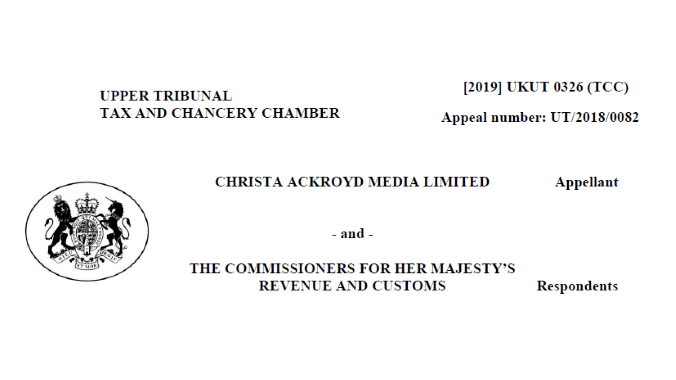Television presenter Christa Ackroyd has failed in a bid to have her deemed IR35 status overturned at the Upper Tribunal (UT). The former Look North presenter had lodged an appeal against the conclusions drawn by the First-Tier Tribunal (FTT) concerning her engagement with the BBC between 2006 and 2013, the ruling for which emerged in February 2018.
However, the decision was ultimately upheld by the UT, which concluded that the FTT was correct in asserting an ultimate right of control over Ackroyd in the absence of any clear indicator within the contract.
This was in spite of the FTT’s analysis and reasoning being questioned on several occasions by Mr Justice Mann and Judge Thomas Scott, who noted: “The FTT took the wrong approach but it reached the same result as if it had taken the right approach.”
“Whilst I was not persuaded that the FTT’s reasoning was entirely right, I felt that the facts overwhelmingly pointed towards IR35 being engaged, given the considerable level of control that the BBC exerted over Ms Ackroyd,” comments tax barrister Keith Gordon, of Temple Tax Chambers. “Although there will be passages of relevance to other IR35 cases, the main lesson to take from the recent decision is that each case turns on its own set of facts.”
Ackroyd control arguments rejected by UT
In a case which hinged almost exclusively on the element of control, Ackroyd’s representatives stated that while the BBC may have controlled her ‘output’, it did not control her ‘input’, which they argued was the relevant factor in determining employment control.
However, this argument was rejected by the tribunal, in part because the approach hadn’t been adopted in previous tax tribunal cases where control had been considered in an employment context.
However, as Chaplin highlights, Mr Justice Mann and Judge Thomas Scott might have been too quick to dismiss the position: “It was surprising the see the judges not consider in more detail the differences between control over the input and control over the output. If I hire someone to build me a car, the fact that I drive it afterwards does not indicate control over them building it in the first place. That’s the essential concept that is still, in my opinion, not fully resolved for these cases involving presenters.”
Cruel conclusion for Ackroyd provides key lessons for contractors
“What’s really frustrating about these cases is that they are based on the pre-reformed Off-Payroll rules,” continues Chaplin. “This means that the freelancer, in this case Ackroyd, is deemed liable for employer’s National Insurance (NI) which under the Off-Payroll rules would rightfully be paid by the BBC. Had Ackroyd’s status been assessed under these the new rules, she would not have an extra tax bill, and it would be the BBC picking up the bill for the perceived avoidance of the employment taxes.”
As Martyn Valentine of The Law Place observes, the significance of this judgment for contractors is that it provides welcome clarification on the issue of control in determining employment status:
“Where a contract is silent on the issue of control, the tribunal must consider where the ultimate right of control lies by reference to all the circumstances of the engagement. In this instance, this included the BBC's obligations to the Secretary of State and the seven-year fixed term nature of the engagement.”
Valentine also highlights a number of other key lessons for contractors:
- It’s essential to consider whether any regulatory or external matters, such as Editorial Guidelines, can impose a right of control
- Fixed term engagements will lead to a verdict of deemed employment
- The duration of a contract must always be determined by completion of services provided
“Finally, this judgment underscores the importance of seeking advice before embarking on a long-term contract, especially where there is a lack of clarity regarding control.”

